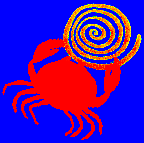

![]()
My laboratory uses the stomatogastric ganglion of crabs and lobsters (a small and well-defined motor circuit) as a model system for study of the mechanisms that underlie the functional
plasticity of neurons and of animal behaviors. The neurons that we study are both motorneurons
and part of several pattern generating circuits.
Neuromodulator inputs can alter the properties
of the cells and their synaptic and electrical interactions within the larger neural network,
reconfiguring the network for different motor outputs. The questions we ask include: what are
the "baseline" properties of the different neurons and how do the modulator transmitters
reconfigure cell properties and thereby change circuit function.
The techniques used in my lab include: intracellular recording, voltage clamp, and calcium
imaging from neurons either in ganglia or in cell culture; immunohistochemistry and intracellular
dye injection for neuron reconstruction using confocal microscopy and electron microscopy; and
mathematical models of neuron and network function.
Current research by graduate students is
on the role of the second messenger, cyclic GMP, in the development and modulation of the
stomatogastric nervous system and on the types, distribution, and functioning of calcium
channels on stomatogastric neurons.

 Ross, W.N., Graubard, K. Spatially and temporally resolved calcium changes in
oscillating neurons of the crab stomatogastric ganglion. Proc. Natl. Acad. Sci.,
U.S.A. 86:1679-1683 (1989).
Ross, W.N., Graubard, K. Spatially and temporally resolved calcium changes in
oscillating neurons of the crab stomatogastric ganglion. Proc. Natl. Acad. Sci.,
U.S.A. 86:1679-1683 (1989).
 Hartline, D.K., Graubard, K. Cellular and synaptic properties. In: Dynamic
Biological Networks: The Stomatogastric Nervous System, edited by R. M. Harris-Warrick, E. Marder, A.I. Selverston and M. Moulins, Boston, MIT Press, pp. 31-85 (1992).
Hartline, D.K., Graubard, K. Cellular and synaptic properties. In: Dynamic
Biological Networks: The Stomatogastric Nervous System, edited by R. M. Harris-Warrick, E. Marder, A.I. Selverston and M. Moulins, Boston, MIT Press, pp. 31-85 (1992).
 Zirpel, L., Baldwin, D., Graubard, K. Nickel induces oscillatory behavior and
enhanced synaptic and electrotonic transmission between stomatogastric neurons of
Panulirus interruptus. Brain Res. 617:205-213 (1993).
Zirpel, L., Baldwin, D., Graubard, K. Nickel induces oscillatory behavior and
enhanced synaptic and electrotonic transmission between stomatogastric neurons of
Panulirus interruptus. Brain Res. 617:205-213 (1993).
 Christie, A.E., Baldwin, D., Turrigiano, G., Graubard, K., Marder, E.
Immunocytochemistry of multiple cholecystokinin-like peptides in the stomatogastric
nervous system of the crab, Cancer borealis: Regional distribution and
colocalization with other neuromodulators. J. Exp. Biol.198:263-271 (1995).
Christie, A.E., Baldwin, D., Turrigiano, G., Graubard, K., Marder, E.
Immunocytochemistry of multiple cholecystokinin-like peptides in the stomatogastric
nervous system of the crab, Cancer borealis: Regional distribution and
colocalization with other neuromodulators. J. Exp. Biol.198:263-271 (1995).
 Baldwin, D., Graubard, K. Distribution of fine neurites of stomatogastric neurons of
the crab, Cancer borealis. J. Comp. Neurol. 356:353-367 (1995).
Baldwin, D., Graubard, K. Distribution of fine neurites of stomatogastric neurons of
the crab, Cancer borealis. J. Comp. Neurol. 356:353-367 (1995).
 Scholz, N.L., Goy, M.F., Truman, J.W., Graubard, K. Two distinct pathways for activating
cGMP in the crab stomatogastric nervous system. J. Neurosci. 16:1614-1622 (1996).
Scholz, N.L., Goy, M.F., Truman, J.W., Graubard, K. Two distinct pathways for activating
cGMP in the crab stomatogastric nervous system. J. Neurosci. 16:1614-1622 (1996).


 WORK IN PROGRESS contains abstracts of recent research presentations at the Biophysical Society and the Society for Neuroscience.
WORK IN PROGRESS contains abstracts of recent research presentations at the Biophysical Society and the Society for Neuroscience.
Ray Price's summer 1995 undergraduate research project
There is a more complete list of publications.

Click here to send e-mail to Graubard@U.Washington.edu
Eve Marder's Lab
Dan Hartline's lab
and
other labs working on the stomatogastric ganglion.
revised November 1997